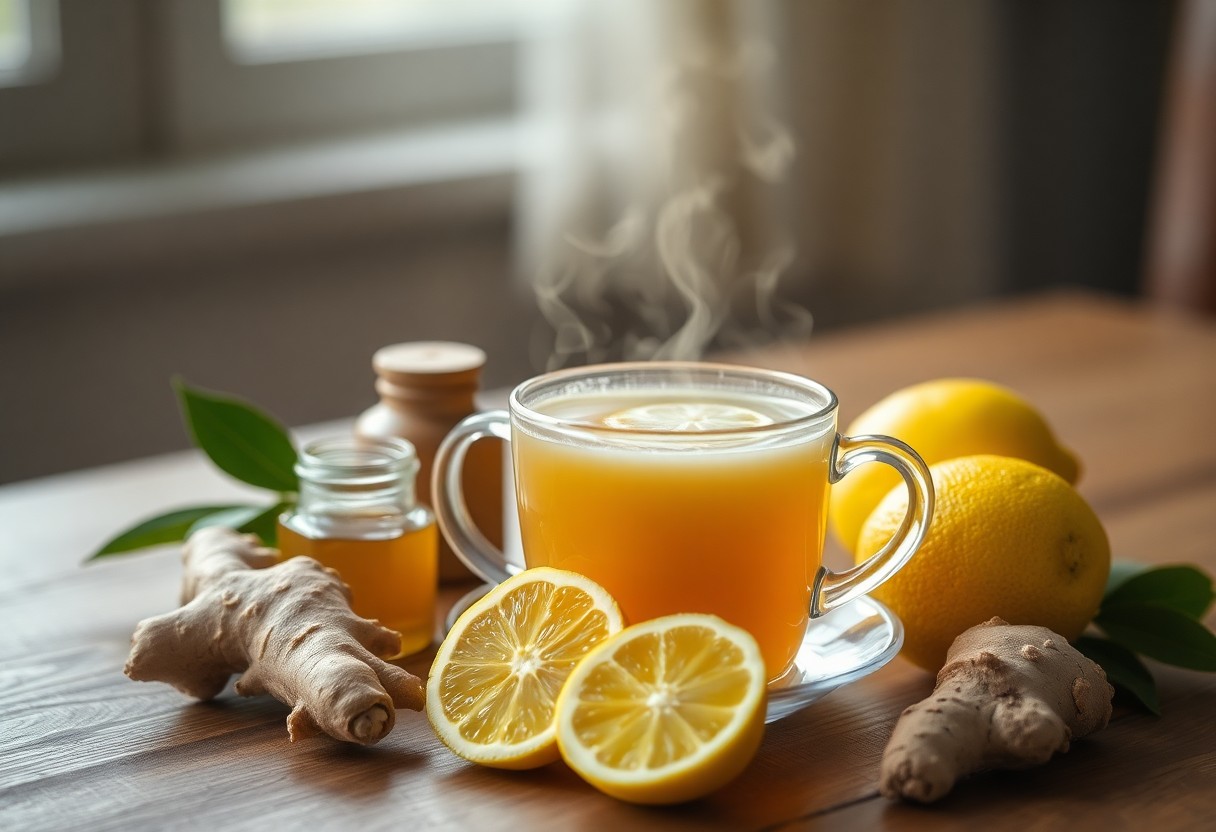Tea lovers often seek out lemon and ginger tea for its invigorating flavor and numerous health benefits. This delightful brew can enhance your immune system, aid digestion, and even give you a boost of energy. However, it’s important to also be aware of its potential side effects and know when you should avoid it altogether, especially if you have specific health conditions or are taking certain medications. In this blog post, you will discover everything you need to know about enjoying lemon and ginger tea safely and effectively.

Key Takeaways:
- Lemon and ginger tea can enhance digestion, boost the immune system, and provide anti-inflammatory benefits, making it a popular choice for overall wellness.
- Potential side effects include heartburn, digestive discomfort, or allergic reactions in some individuals; moderation is key when consuming this tea.
- It may be best to avoid lemon and ginger tea during pregnancy, if you are on blood-thinning medications, or if you have certain health conditions that could be aggravated by its ingredients.
Health Benefits of Lemon and Ginger Tea
The combination of lemon and ginger in tea offers a variety of health benefits that can enhance your well-being. This refreshing drink not only provides a burst of flavor but also supports your body through its rich nutritional profile. The synergistic effect of these ingredients can aid in digestion, boost your immune system, and improve overall health.
Antioxidant Properties
An exceptional benefit of lemon and ginger tea is its antioxidant properties. Both lemon and ginger are packed with vitamins and compounds that help combat oxidative stress in your body. By incorporating this tea into your routine, you are actively supporting your body’s ability to fight free radicals, which can lead to improved health and longevity.
Digestive Health
After consuming lemon and ginger tea, you might notice improved digestive health. The natural compounds in ginger stimulate digestion, while lemon juice promotes a healthier gut by balancing acidity levels. Together, these ingredients can help alleviate common digestive issues such as bloating and indigestion.
Indeed, many people find that regularly drinking lemon and ginger tea enhances their digestion by promoting the secretion of digestive enzymes. This natural beverage can help ease discomfort and create a smoother digestive process, allowing you to enjoy your meals without the burden of gastrointestinal distress. If you’re prone to digestive issues, this tea might provide the relief you seek.
Immune Support
Digestive health is often closely linked to immune support, and lemon and ginger tea excels in this area as well. Both ingredients are renowned for their ability to enrich your body’s defenses, making you less susceptible to illnesses.
Ginger contains compounds that have antibacterial and anti-inflammatory properties, which can help fend off infections. Combined with the high vitamin C content of lemon, this tea acts as a powerful natural remedy to fortify your immune system. Regularly sipping on lemon and ginger tea can be an effective strategy for maintaining your health and preventing seasonal illnesses.
Potential Side Effects
Assuming you consume lemon and ginger tea in moderation, the benefits often overshadow potential side effects. However, it’s important to be aware of how your body may react, as certain individuals might experience discomfort. Common side effects can include allergic reactions or gastrointestinal issues, which you should consider before making this tea a regular part of your routine.
Allergic Reactions
Allergic reactions to lemon and ginger tea can occur, particularly if you have sensitivities to citrus fruits or ginger. Symptoms may include hives, itching, or difficulty breathing. If you experience these symptoms, it is vital to stop consuming the tea and seek medical advice immediately to prevent severe complications.
Gastrointestinal Issues
After consuming lemon and ginger tea, some individuals may encounter gastrointestinal discomfort. This can manifest as symptoms like nausea, stomach cramps, or diarrhea. If you’re susceptible to digestive issues, it’s wise to begin with a small amount to see how your body responds.
Side effects related to stomach upset may arise due to the acidity in lemon and the spiciness of ginger. If you have a sensitive stomach or a pre-existing condition such as acid reflux, you should be cautious about how much lemon and ginger tea you consume. Always pay attention to your body’s signals, and consider consulting a healthcare provider if gastrointestinal issues persist.

When to Avoid Lemon and Ginger Tea
For some individuals, consuming lemon and ginger tea may not be advisable due to certain health conditions or life stages. It’s vital to recognize when this herbal remedy might cause more harm than good, so you can make informed decisions about your wellness routine.
Pregnancy and Nursing
One reason to avoid lemon and ginger tea is during pregnancy and nursing, as excessive ginger can lead to side effects such as heartburn or upset stomach. Consulting your healthcare provider is recommended to ensure both your health and your baby’s safety.
Medical Conditions
The consumption of lemon and ginger tea may not be suitable for individuals with specific medical conditions, such as bleeding disorders, gastric ulcers, or those on certain medications. Monitoring your body’s reactions is vital when incorporating this tea into your routine.
Consequently, if you have a bleeding disorder or are scheduled for surgery, it’s best to steer clear of ginger due to its blood-thinning properties. Additionally, individuals with gastric ulcers might find that the acidic nature of lemon exacerbates their condition. Therefore, always consult with your healthcare professional to determine the safest options for your health.
Drug Interactions
Any individuals on medications should exercise caution when consuming lemon and ginger tea, as it may interact with certain drugs, potentially altering their effectiveness or intensifying side effects.
Ginger, in particular, has been known to interact with anticoagulants and antiplatelet medications, increasing the risk of bleeding. Additionally, it may affect the metabolism of other medications, leading to unwanted side effects. Always consult with your healthcare provider to prevent undesirable interactions and to ensure safe consumption of lemon and ginger tea alongside your prescribed medications.
How to Prepare Lemon and Ginger Tea
Now, to prepare your lemon and ginger tea, start by boiling 2 cups of water in a pot. Once it reaches a rolling boil, add 1 tablespoon of freshly grated ginger and simmer for about 10 minutes to extract the maximum flavor and benefits. Next, remove the pot from heat and squeeze in the juice of one medium-sized lemon. Pour the mixture through a strainer, and add honey or sweetener as desired. This easy process not only refreshes you but also provides amazing health benefits!
Tips for Maximizing Benefits
To maximize the benefits of your lemon and ginger tea, consider the following tips:
- Use fresh, high-quality ginger and lemons for optimal flavor and health benefits.
- Allow the tea to steep longer to extract more antioxidants and vital oils.
- Combine with a drizzle of honey for added sweetness and soothing properties.
- Drink it warm, especially in the morning, to kickstart your metabolism.
Thou can enjoy the numerous advantages of this tea by incorporating it into your daily routine thoughtfully.
Frequently Asked Questions
After exploring the benefits of lemon and ginger tea, you may have some questions. This herbal drink can provide immune support and aid digestion, but you should also be aware of potential side effects, like heartburn or allergic reactions. If you have conditions such as gallstones or are on certain medications, it’s wise to consult your healthcare provider before incorporating it into your diet. Understanding these factors can help you enjoy the advantages of lemon and ginger tea safely.
Final Words
With this in mind, incorporating lemon and ginger tea into your daily routine can offer numerous health benefits, such as improved digestion and boosted immunity. However, you should also be aware of potential side effects like heartburn or allergic reactions, particularly if you have specific health conditions. It’s wise to consult with a healthcare professional if you’re pregnant, nursing, or taking medications. Ultimately, enjoy your tea while remaining mindful of your body’s responses to ensure the best experience and benefits.
FAQ
Q: What are the primary health benefits of Lemon and Ginger Tea?
A: Lemon and Ginger Tea offers a variety of health benefits. It is known for its anti-inflammatory properties, which can help reduce symptoms of colds and flu. The combination can enhance digestion, providing relief from gastrointestinal discomfort. Additionally, the antioxidants found in both lemon and ginger may support the immune system and help in detoxification. Drinking this tea can also promote hydration, and the vitamin C in lemons is beneficial for skin health.
Q: Are there any side effects associated with drinking Lemon and Ginger Tea?
A: While Lemon and Ginger Tea is generally safe for most people, some individuals may experience side effects. These can include heartburn and stomach upset due to the acidity of lemon and the spiciness of ginger. Allergic reactions, although rare, can occur, particularly in individuals sensitive to ginger. Overconsumption may lead to gastrointestinal issues such as diarrhea. Therefore, it’s advisable to moderate intake and observe how your body reacts.
Q: When should I avoid drinking Lemon and Ginger Tea?
A: It is best to avoid Lemon and Ginger Tea if you have certain medical conditions. Individuals with gastroesophageal reflux disease (GERD) may find that the acidity of lemon exacerbates their symptoms. People taking anticoagulant medications should consult their healthcare provider, as ginger may interfere with blood clotting. Pregnant women should also seek medical advice, as excessive ginger can affect pregnancy stability. If you have allergies to any ingredient, avoiding the tea is recommended.
Q: How can I prepare Lemon and Ginger Tea at home?
A: Preparing Lemon and Ginger Tea is simple and can be done easily at home. Start by boiling water, then add freshly grated or sliced ginger (about 1-2 teaspoons) and let it steep for 5-10 minutes. Afterward, strain the tea to remove ginger pieces. Add juice from half a lemon and sweeten with honey or your preferred sweetener if desired. This delightful drink can be served hot or cold, making it versatile for any season.
Q: Is there any specific time during the day that is best for drinking Lemon and Ginger Tea?
A: The best time to enjoy Lemon and Ginger Tea can vary depending on individual preferences. Many people find it beneficial to drink in the morning to kickstart digestion and hydration for the day. It can also be a soothing evening drink that promotes relaxation. However, it’s best to avoid drinking it right before bedtime if you are sensitive to caffeine or acidity, as it may disrupt sleep. Experiment with different times to see what works best for you.
